Do you often have the knee-jerk reaction that makes you fear impending doom whenever something good happens to you? If yes, chances are you are suffering from abandonment issues.
Keep reading to know all about abandonment issues, including how to overcome your abandonment problems to live a productive and fulfilling life.
What Are Abandonment Issues?
Abandonment issues are often characterized by incessant and intrusive thoughts coupled with compulsive behavior that stems from a deep-seated fear of abandonment. Simply put, it is an uncontrollable fear that the people or things you deeply care about, sooner or later, will inevitably leave you behind.
If living with a constant fear of abandonment is not bad enough, this can lead to other unfortunate behavioral tendencies. For a person dealing with abandonment issues, this chronic fear of being left out, rejected, ignored, and excluded becomes so overbearing that they devise unhealthy coping mechanisms, exhibiting more than one of the following traits:
- Needy
- Insecure
- Clingy
- Jealous
- Manipulative
- Obsessed
- Controlling
- Addicted to substance abuse
- Dependent on abusive partner(s) with a string of failed relationships
- Self-imposed isolation
What Causes Abandonment Issues?
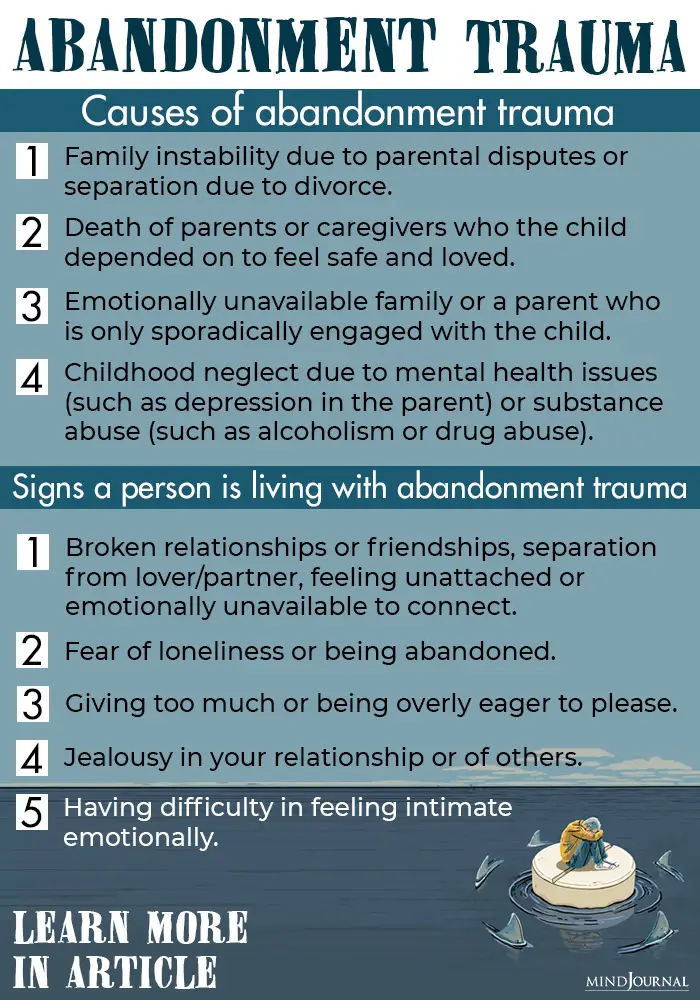
Abandonment issues can germinate as a result of feeling vulnerable due to any of the following reasons:
- Insecure attachment style developed in childhood due to an unreliable, unpredictable, abusive, or absent parent or primary caregiver
- Abandonment by one or both parents due to divorce or separation
- Emotional abandonment or physical neglect from a trusted adult
- Rejection by a partner, spouse, friend, relative, or a loved one
- Death or incarceration of a loved one
- Loss of a job or mistreatment at work
- Monetary loss or financial distress
In a nutshell, the feeling of being left in a lurch due to an unexpected and unwanted separation from a loved one or any kind of loss, at any given point in time, that makes a person feel unsafe in similar future situations, can cause abandonment issues.
Read: Why Family Scapegoats Become Lifelong Victims
20 Signs Of Abandonment Issues
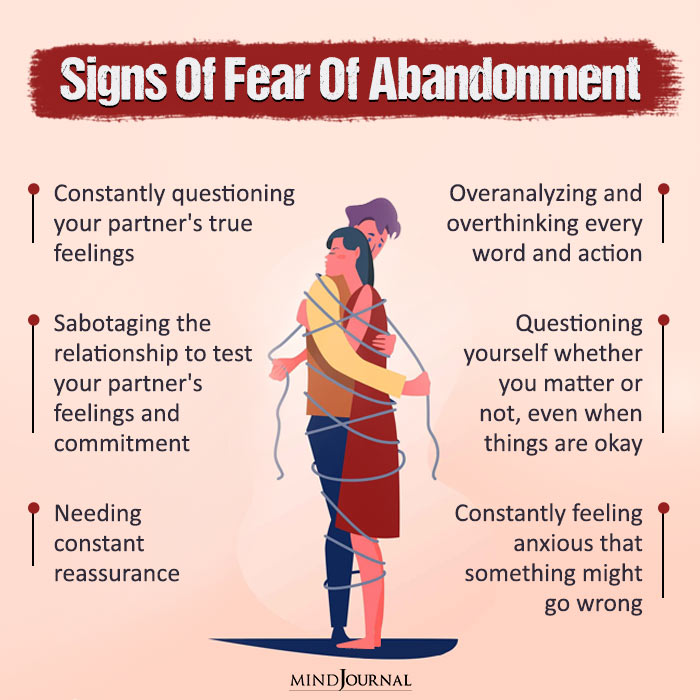
Here are the signs of abandonment issues in adults. You might not relate to all of them, but many of these abandonment issues symptoms will stand out to you if you suffer from abandonment issues.
1. Forming Quick Attachments
Driven by your abandonment issues, you form attachments too quickly and often with the wrong people. You are so scared of being alone that you seize the first opportunity you get to be in a relationship. You tend to get way too emotionally invested in people who show the faintest interest in you.
2. Always Chasing Relationships
Your abandonment issues make you chase people, and you are always on the lookout for love or companionship. Soon after a relationship falls apart, even a long-term one, you are on to your next partner.
Many could wrongly perceive this as your indomitable spirit of bouncing back after a setback, but the truth of the matter is that your abandonment issues make it hard for you to stay single and on your own.
3. Settling For Less In Relationships
As mentioned earlier, you often settle for less. The thought of being alone is so unbearable to you that you are ready to put up with dysfunctional relationships and partners who are critical, neglectful, or even abusive.
In non-romantic relationships too, you tend to be around toxic connections or frenemies who belittle you or negatively affect your life and emotional well-being.
Due to your abandonment issues, you get drawn to people who remind you of the person who abandoned you. In addition to your fear of being left alone, subconsciously, you try to get a “second chance” by making them stay in your life or give you the love and care that you didn’t receive the first time you were abandoned.
4. Nitpicking On Your Partner
You are so afraid of your relationship falling apart, that you take every single relationship issue very seriously and that includes flaws or perceived flaws of your partner.
Your abandonment issues lead you to magnify each little quirk or mistake made by your significant other and blow it out of proportion. Your habit of making a big deal out of everything often becomes a self-fulfilling prophecy as your constant criticism drives your loved one away.
5. People-Pleasing Attitude
You desperately try to keep your loved ones happy, and for this, you go out of your way to make them love or appreciate you. You anticipate others’ needs and try to fulfill them at any cost.
While it’s an admirable thing to care for the ones you love, the problem is you tend to take it too far and often at the expense of your own happiness or well-being.
This again opens a trap door, and you risk getting manipulated or exploited by people who do not have your best interest at heart. You might end up sacrificing a lot to keep the peace in a relationship.
6. Craving External Validation
Your entire concept of self depends on others’ validation. You need constant reassurance that the people in your life are pleased with you and satisfied with the relationship. This need for frequent validation makes you needy and vulnerable.
7. Commitment Issues
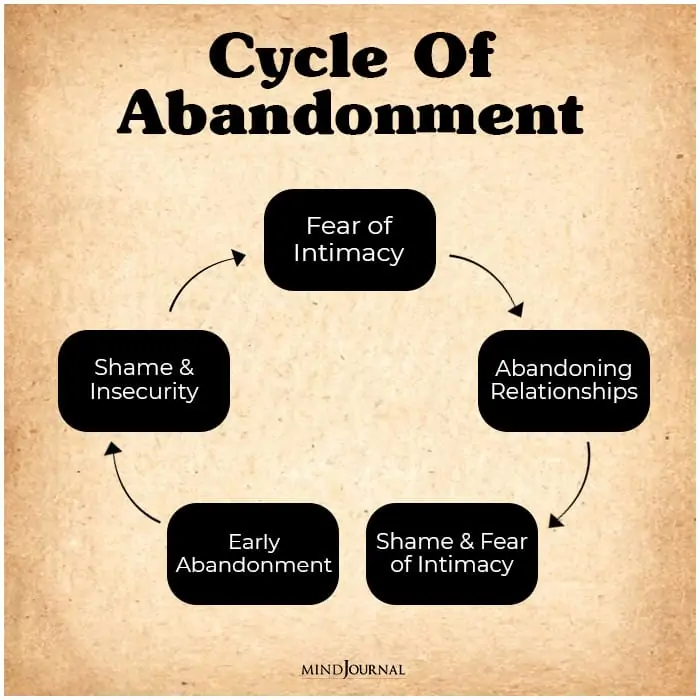
As much as you want people to stay in your life, you are afraid to commit to a long-term relationship fearing being let down. You feel that by trying to make a relationship stable and long-lasting, you will set yourself up for failure and disappointment as nothing lasts forever… and everybody leaves ultimately. You can’t take that risk of getting hurt.
8. Being Envious Of Others
You can’t help but feel a tinge of jealousy every time you come across someone who is visibly happy, either in a relationship or a single. You feel you are being wrongly denied the happiness and fulfillment you deserve.
9. Unhealthy Attachment Style
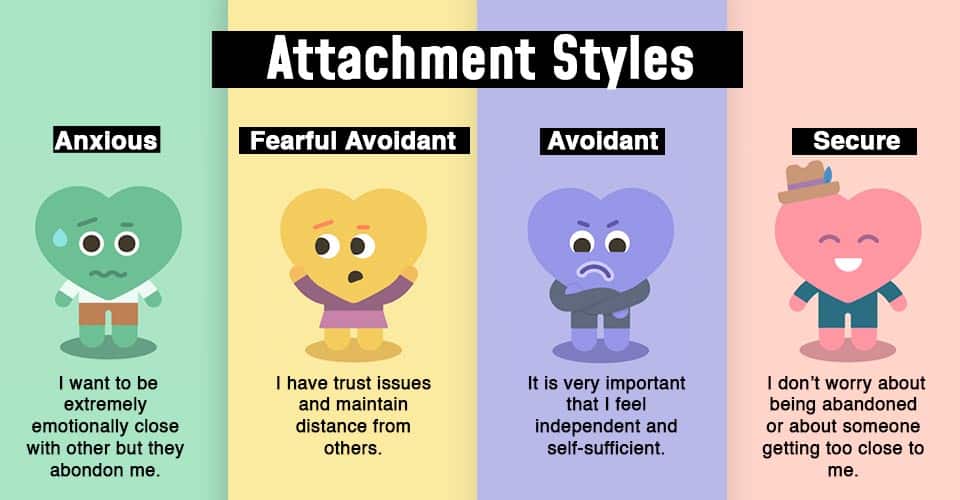
Abandonment issues formed at an early age due to an abusive or absent parent or primary caregiver typically lead to unhealthy attachment styles. You feel insecure, anxious, and confused in your relationships. You might also end up avoiding emotional intimacy altogether.
Read: 4 Attachment Style
10. Poor Sense Of Self
Your abandonment issues have convinced you to believe that:
- You don’t have much to offer
- You are not of much value to anyone
- You don’t deserve love
- You don’t have what it takes to be happy and successful in life
All these negative self-talk and limiting beliefs strengthen your poor sense of self and lack of confidence in yourself, making you settle for less and put up with poor treatment from others.
11. Self-Sabotaging Tendencies
When you are finally in a positive and happy relationship with someone and things are going great for you, somehow you find a way to self-sabotage your prospects. You do or say things that put a strain on your relationship.
12. Trust Issues
When you find yourself a high-value partner who, according to you, is a catch, your abandonment issues start making you doubt their integrity and love for you.
You suspect your partner’s interest in you is very soon going to dwindle. As a result, you look out for signs of cheating, and everyone important in their life becomes a threat to you. This lack of trust extends to your other platonic relationships as well.
13. Separation Anxiety
Abandonment issues can manifest as severe separation anxiety. Whenever you are at a distance from your loved ones, you start panicking that they will forget you or replace you with someone new.
14. Trying To Control Others
Your abandonment issues can make you behave like a control freak who stalks and spies on their loved ones so they don’t get close to someone behind your back.
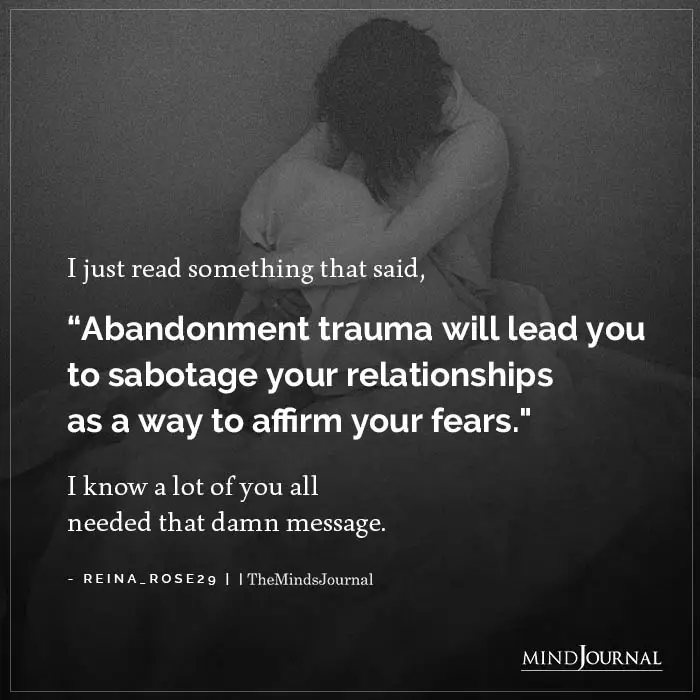
15. Getting Attracted To Emotionally Unavailable Partners
It is common for people with abandonment issues to get drawn to partners or friends who are emotionally unavailable. This happens mainly because:
- They are trying to avoid emotional intimacy
- The person who abandoned them was also emotionally distant or absent
As toxic patterns are familiar to those with abandonment issues, they find these dysfunctional routines to be comforting.
16. Blaming Yourself When A Relationship Goes South
If you struggle with abandonment issues, you might hold yourself responsible for the original abandonment. And you also tend to blame yourself for every relationship that ends, even the abusive or toxic ones.
17. Angry Outbursts
Abandonment issues generated from the initial abandonment make you feel stripped of your power to control an unfavorable situation. This helplessness can give way to anger and resentment that fester beneath the surface.
Even after a long time, you can get triggered and lash out at others if they somehow remind you of your abandonment trauma.
18. Difficulty In Accepting Rejection
You might have a hard time letting go of people who clearly do not wish to stay in your life. You can not come to terms with the fact that you are being left out in the cold, again! This could push you to cling to others and manipulate or force them to continue the relationship.
19. Depressive Episodes
If situations and people keep triggering abandonment trauma, it becomes unbearable for someone with abandonment issues to live a happy life. Untreated and unresolved emotional distress can even lead to mental breakdowns and self-harm.
20. Overthinking Everything
Your partner or friend fails to notice a text message from you, and this one tiny little event pushes you down the rabbit hole of obsessive and negative thinking. You start wondering if they are trying to avoid you or if you have done something to upset them.
Overthinking can eventually destroy even the healthiest relationships.
If you can identify the above symptoms, read on to learn how to overcome abandonment issues.
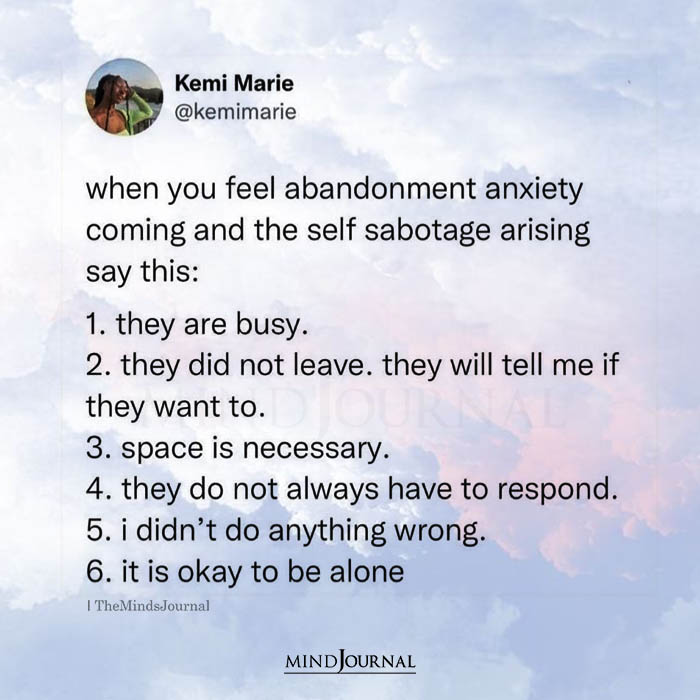
How To Heal From Abandonment Issues?
To get over your trauma of abandonment and heal from abandonment issues,
- Recognize the source of your abandonment trauma.
- If you have attachment issues, you can monitor how they are influencing your behavioral patterns in relationships.
- You can work toward forming secure attachment styles by being aware of your vulnerabilities.
- Voicing your needs through clear communication is always an ideal way to develop healthy relationships.
- You can seek professional help and opt for therapy or relationship counseling
Don’t Let What Happened To You Define You!
Now that you have a fair idea of how to deal with abandonment issues, introspect your behavioral and thought patterns. Sit with your overwhelming emotions and get to the root of your fear of abandonment.
Then work on developing healthy self-esteem, trust, and secure attachments. Please don’t let your abandonment wound keep festering beneath a seemingly functional and busy life.
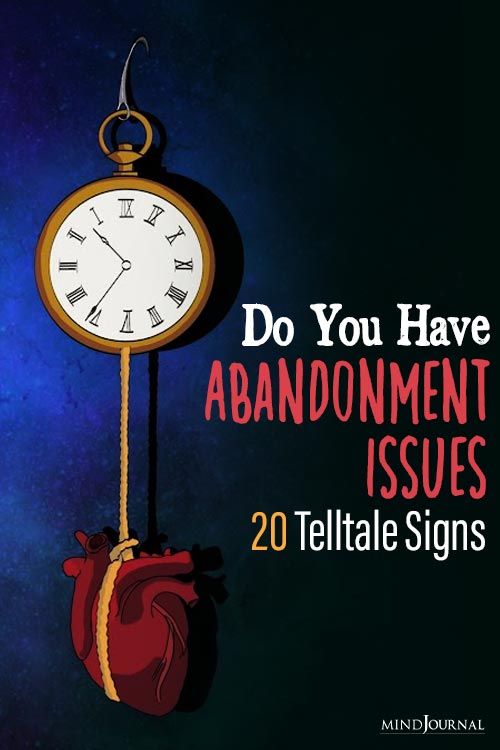
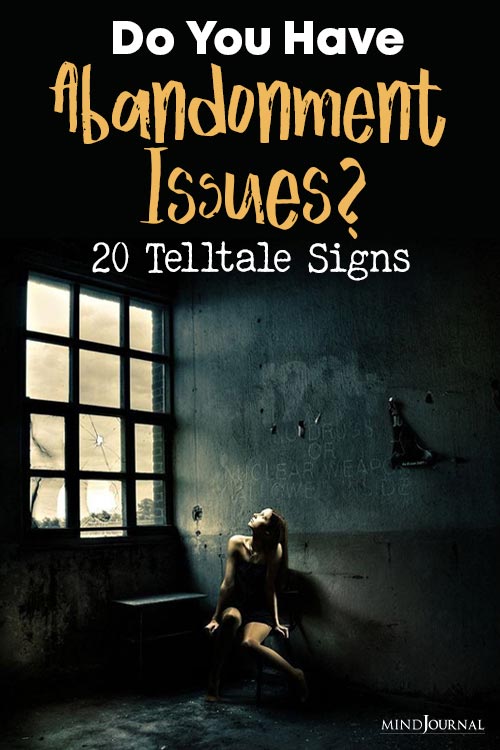

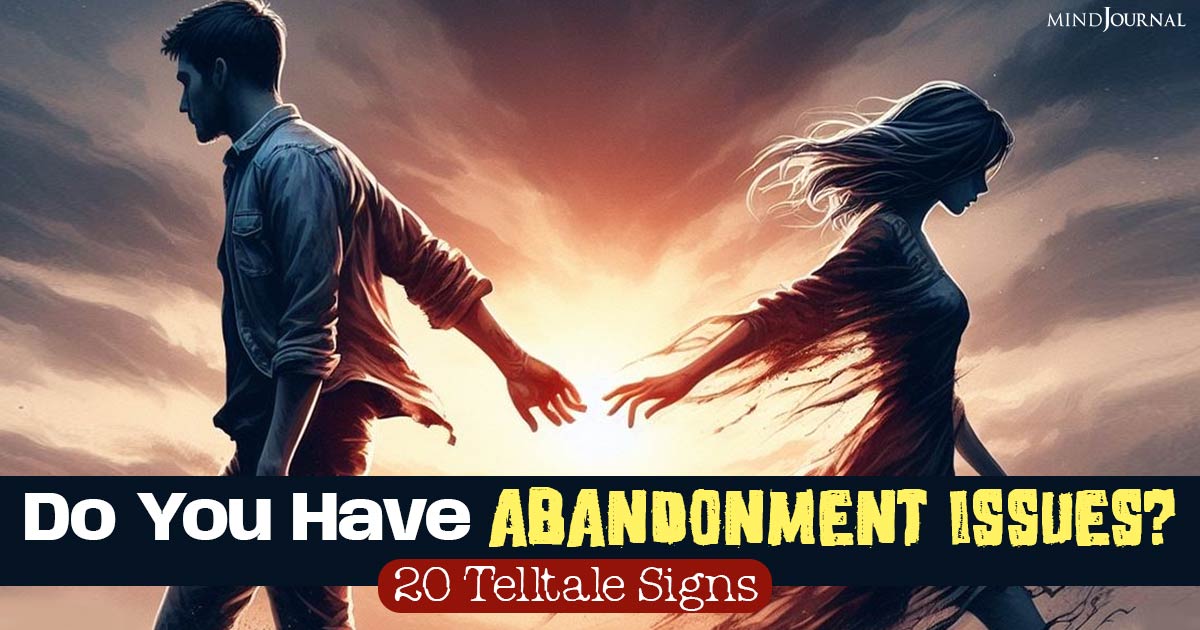






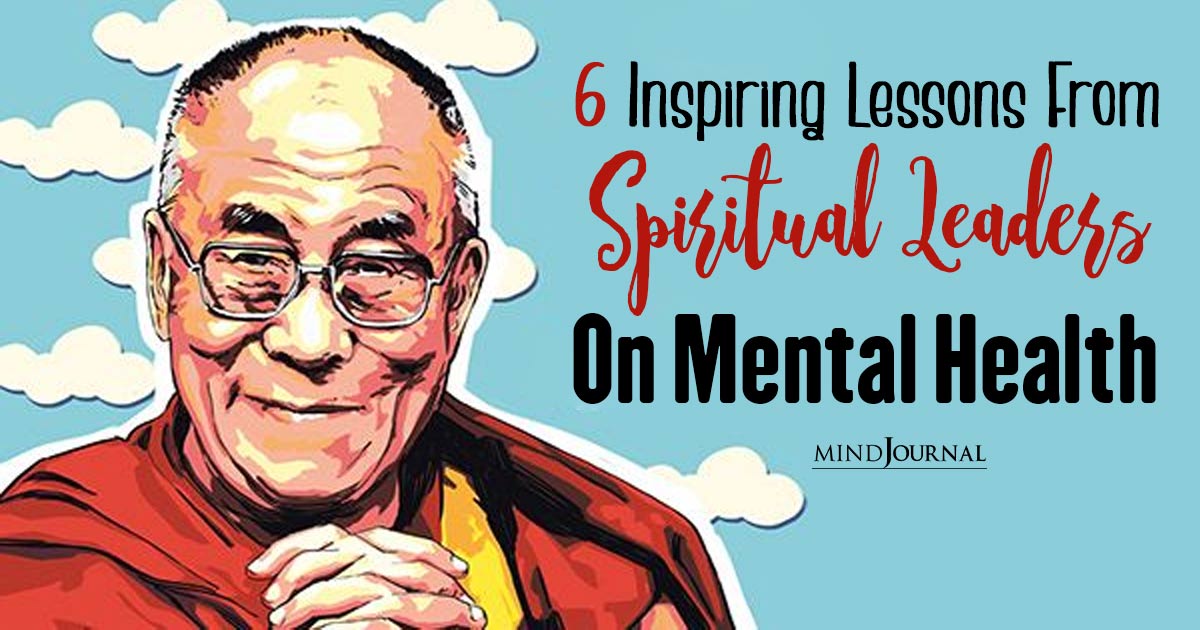
Leave a Reply
You must be logged in to post a comment.